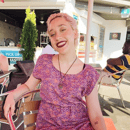When you think of non-fiction, graphic novels probably don’t come to mind. This is fair; most of us might think more along the lines of comic books or manga. But 15 years ago, with the paperback publication of Alison Bechdel’s Fun Home, we saw a genre revolutionized.
First, some history
Okay, so Fun Home isn’t the first non-fiction graphic novel, but it’s seriously iconic. Some other popular ones that came out around that time are Maus – an incredibly-accurate graphic novel about the Holocaust told through animals; Persepolis – one woman’s real-world experience through the Iranian Islamic revolution, and Palestine – an American journalist’s journey through the Gaza strip. Let’s face it, the mainstream world of graphic novels isn’t always non-fiction, but that doesn’t mean they aren’t worth seeking out. Fun Home is Alison Bechdel’s ode to her family: The messiness, complexities, horrors, pain, laughter and the bonds that only a family can share. Even in the unexpected death (suicide?) of a parent, a family is still worth figuring out and fighting for. If you don’t know the name Alison Bechdel, you probably know The Bechdel Test. The grading is simple. If two women in a movie can go more than two minutes talking to each other about something other than a man, the movie passes the test. If they can’t, it fails. It’s worth noting that the Bechdel Test isn’t a judge of whether a movie is good or not. It was originally just a test for Bechdel to decide if she, a lesbian, could potentially see herself represented. Before there was Fun Home, there was Dykes to Watch Out For. Bechdel created this amazing comic strip for over 20 years before she wrote and designed Fun Home. I won’t spoil it, but if you’re looking for LGBT representation in comics, this is one of the originals.
Visually, everything works
Fun Home is different from Dykes to Watch Out For, though naturally, they both carry Bechdel’s iconic art style and ability to find humour in the strangest of places. Fun Home is a story that hooks you from the start. It’s the kind of story that, sure, could be a novel, but it works so much better as a comic. Bechdel uses every part of the page in telling the story. If something is left blank, it’s always on purpose. The story is full of layers: Bechdel is telling us her story as the narrator, meanwhile she draws the story as her younger self, and the dialogue from everyone adds another element. Plus, there is storytelling through the art itself. If you look closely enough, you can see that every panel adds to the overall story, there’s no filler. Every single word counts. Literally, you can count the words in the narration parts: No piece of narration is longer than three lines above the panel. Characters and perspectives change alongside the story. Some pages have the reader looking down, similar to how Bechdel’s parents would look down on her, literally and figuratively. Other pages show that Bechdel has established a power balance: You see through her perspective the people who actually meet her at eye level and the people who see her as an equal––other lesbians. Fun Home takes a page and brings every corner to life. Even 15 years later, there is so much to look at as you read it over and over again.
There is a terrifying reality that we may never get closer to our past
If you think you know your family, think again. Fun Home tells us that as long as there are people, there are secrets––especially in death. This comic is about Bechdel’s struggle to come out as gay to her family, but it’s also about the parallel of her father struggling to come out as gay himself. While she is chastised by him for behaving in a more tomboyish manner, he seemingly pushes the femininity he wishes he could express onto her with makeup, jewellery and dresses. It makes us ask ourselves if there’s any point in living when you can’t truly be yourself. What’s harder, admitting to everyone you love that you’re not who they thought you were, or seeing that same reality outplayed in your daughter, in front of your very eyes? Even if we spend years and years growing up with someone, can we ever really know them as well as we want to? And what if they don’t want to be known? Or even more so, what if they desperately want to be known, but don’t know how to say it? Fun Home is more than just this story of a family, it’s the terrifying idea that at any point, someone could just opt-out of their life. What’s to stop someone from buying a one-way plane ticket in the middle of the night only to never return? Or in the case of Bechdel’s father, what’s to stop someone from getting run over by a freight truck? Closure is a concept that most of us will never get. Especially when a loved one dies, we often have more questions than when they were alive. All we know is that we don’t have enough time to ask the questions we won’t even know we’ll have until after they die.
Fun Home tells us that truth is stranger than fiction
There is deception at every turn in Fun Home. This graphic novel actually reminds me of why I fell in love with journalism in the first place: People have the most incredible stories to tell. If you were to pitch the story of a lesbian in college, not sure how to mourn the death of her father, which may or may not have been a suicide; a man who only came out as gay just weeks after his daughter and weeks before his own demise, all while the family ran a funeral home and lived in a Victorian-era house straight out of The Addams Family, well, Netflix would probably cancel it after a season. I can already hear the reviews: “Two gay people in one family? Weird ending to this guy’s life? Secret gay sex with the gardener? Unrealistic, much? 2/10, pushing the gay diversity angle to the extreme.” Life is so much messier than any fictitious story because it’s all real. And honestly, that makes our hearts break just a little bit more than we’d like.
It’s full of irony and finds humour in darkness
Probably what stands out to me the most when I read Fun Home is that there is so much irony. I mean, it’s hard to miss the immediate parallels between Bechdel and her father as they both struggle with their sexuality. Though the story is a memoir, Bechdel uses characters from mythology to often describe her parents, especially her father. She often relates him to both Daedalus and his son, Icarus. Could this be a way to rationalize him being both the master and saboteur of his life? She also says her father was obsessed with F. Scott Fitzgerald, both of whom died at age 44. It’s in the darkest moments that Bechdel finds humour. Bechdel also doesn’t tell the story in a typical, chronological way: Rather, she retells different parts of her life once learning new information, leaving the reader with a greater understanding (or confusion), as if we were experiencing it ourselves. Bechdel also finds irony in her father’s favourite books: A Great Gatsby and A Happy Death both often had certain paragraphs highlighted, potentially alluding to the fact that her father may have been thinking about suicide for some time. Her parents were even in Shakespeare’s Taming of The Shrew. It’s almost too ironic that her father’s obsession with Fitzgerald in their fashionable Victorian home mirrored his desire to appear lavish and fulfilled while his relationship with his wife was falling apart, similar to Taming of the Shrew. It tells us we have to laugh, otherwise, we might just start crying.
The paperback of Fun Home came out 15 years ago. Even if you aren’t a fan of graphic novels, it’s just good writing. There are layers everywhere, and the reader is often left with just as many questions that Alison Bechdel had. And we’ll never get the answers. But it’s still worth asking ourselves about how complex storytelling can be when telling our family’s story.


